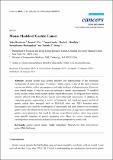| dc.contributor.author | Hayakawa, Yoku | |
| dc.contributor.author | Fox, James G. | |
| dc.contributor.author | Gonda, Tamas | |
| dc.contributor.author | Worthley, Daniel L. | |
| dc.contributor.author | Wang, Timothy C. | |
| dc.contributor.author | Fox, James | |
| dc.contributor.author | Worthley, Daniel | |
| dc.contributor.author | Wang, Timothy | |
| dc.contributor.author | Muthupalani, Sureshkumar | |
| dc.date.accessioned | 2018-01-29T19:18:24Z | |
| dc.date.available | 2018-01-29T19:18:24Z | |
| dc.date.issued | 2013-01 | |
| dc.date.submitted | 2013-01 | |
| dc.identifier.issn | 2072-6694 | |
| dc.identifier.uri | http://hdl.handle.net/1721.1/113333 | |
| dc.description.abstract | Animal models have greatly enriched our understanding of the molecular mechanisms of numerous types of cancers. Gastric cancer is one of the most common cancers worldwide, with a poor prognosis and high incidence of drug-resistance. However, most inbred strains of mice have proven resistant to gastric carcinogenesis. To establish useful models which mimic human gastric cancer phenotypes, investigators have utilized animals infected with <i>Helicobacter</i> species and treated with carcinogens. In addition, by exploiting genetic engineering, a variety of transgenic and knockout mouse models of gastric cancer have emerged, such as INS-GAS mice and TFF1 knockout mice. Investigators have used the combination of carcinogens and gene alteration to accelerate gastric cancer development, but rarely do mouse models show an aggressive and metastatic gastric cancer phenotype that could be relevant to preclinical studies, which may require more specific targeting of gastric progenitor cells. Here, we review current gastric carcinogenesis mouse models and provide our future perspectives on this field. Keywords: gastric cancer; mouse model; metaplasia; Helicobacter felis; Helicobacter pylori; INS-GAS mice | en_US |
| dc.publisher | MDPI AG | en_US |
| dc.relation.isversionof | http://dx.doi.org/10.3390/cancers5010092 | en_US |
| dc.rights | Creative Commons Attribution | en_US |
| dc.rights.uri | http://creativecommons.org/licenses/by/4.0/ | en_US |
| dc.source | Multidisciplinary Digital Publishing Institute | en_US |
| dc.title | Mouse Models of Gastric Cancer | en_US |
| dc.type | Article | en_US |
| dc.identifier.citation | Hayakawa, Yoku et al. "Mouse Models of Gastric Cancer." Cancers 5, 1(January 2013): 92-130 © 2013 The Author(s) | en_US |
| dc.contributor.department | Massachusetts Institute of Technology. Division of Comparative Medicine | en_US |
| dc.contributor.mitauthor | Muthupalani, Sureshkumar | |
| dc.relation.journal | Cancers | en_US |
| dc.eprint.version | Final published version | en_US |
| dc.type.uri | http://purl.org/eprint/type/JournalArticle | en_US |
| eprint.status | http://purl.org/eprint/status/PeerReviewed | en_US |
| dc.date.updated | 2018-01-24T21:04:37Z | |
| dspace.orderedauthors | Hayakawa, Yoku; Fox, James; Gonda, Tamas; Worthley, Daniel; Muthupalani, Sureshkumar; Wang, Timothy | en_US |
| dspace.embargo.terms | N | en_US |
| mit.license | PUBLISHER_CC | en_US |
